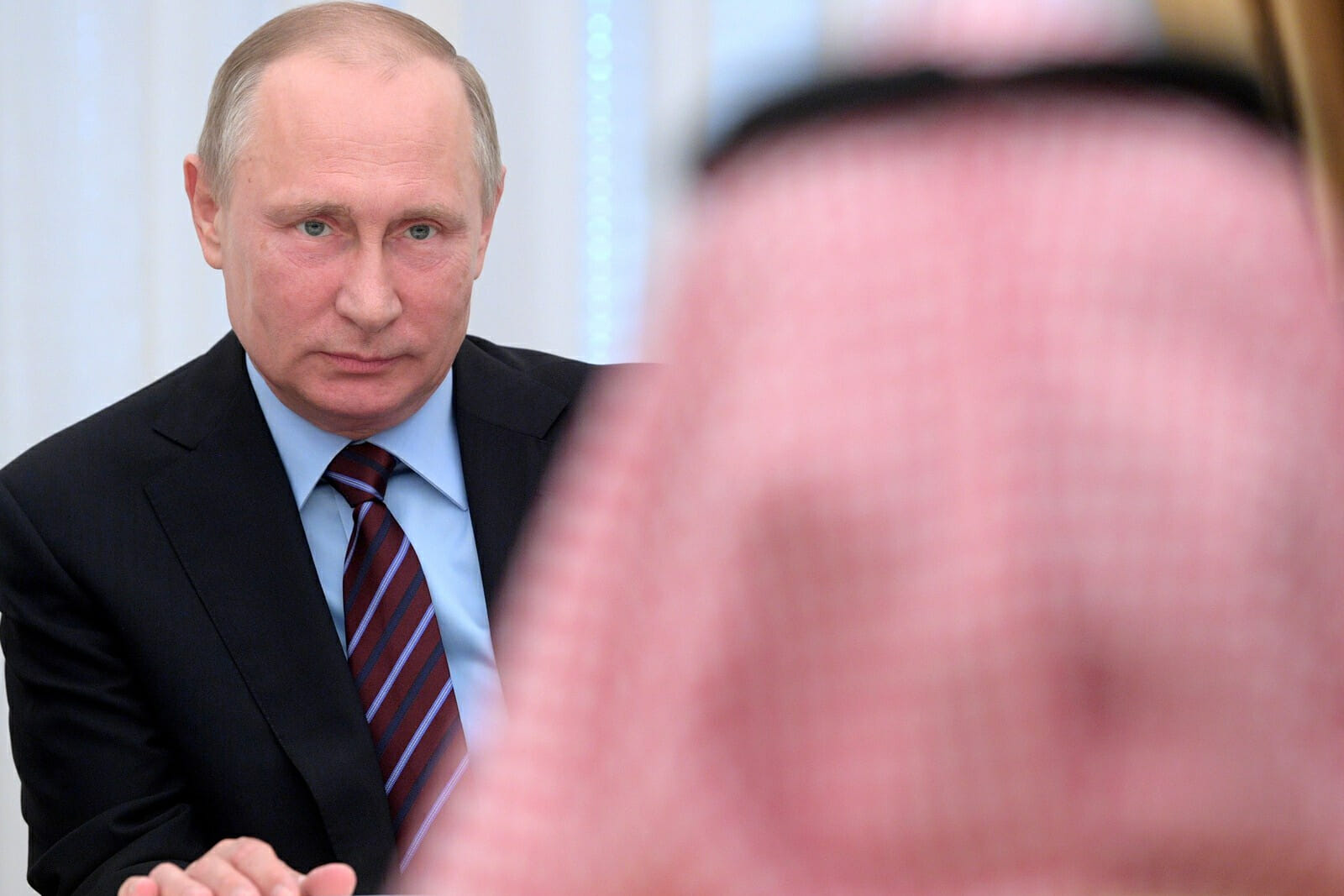
Will Global Crude Heavyweights Russia and Saudi Arabia Make Peace?
The Russia – Saudi bonhomie has witnessed a seismic shift from Putin exchanging warm high fives with MbS at the G20 summit in Argentina, to triggering an oil price war at a time when global oil markets are facing a demand drought due to the coronavirus outbreak. At a time when the world is fighting a global public health crisis, the shifting oil markets have set in motion an economic recession. A failed consensus over coordinated production at OPEC’s meeting in Vienna served as a prelude to this oil price war.
In the meeting in Vienna, Russia blew its three-year alliance with OPEC, after refusing to concede to Saudi Arabia’s demand for cutting crude output by 1 million barrels-per-day. Russia balked to further cut the output as this would mean throwing a lifeline to U.S. shale gas producers, who continue to reap the benefits of higher oil prices without being party to any production cuts.
In a bid to inflict pain on Russia, Saudi Arabia slashed its export prices, making its oil attractive for Asia and Europe. Russia was not going to sit idly by and watch Saudi Arabia hog away its economic pie in the crude market. It ramped up its crude production, thus creating a supply glut and pushing the world economy into further recession.
The Saudi Crowned Prince in a bid to tighten his grip on power has purged senior members of his royal family which will further delegitimize his political standing and induce more criticism of his whimsical foreign policy from the royal family. Further, he faces an uphill task of recovering the economical health of the kingdom fractured by tumbling oil prices. Thus a negotiated settlement is imperative to help MbS navigate through the self-made economic and political troubles.
In the game of playing chicken, it is also imperative to understand who will blink first. Unlike Saudi Arabia, Russia has diversified its sources of income and is in a better position to weather the shock of low prices due to its financial cushion of $570 billion, higher than Saudi Arabia’s $500 billion.
Apart from that, though Russia’s cost of oil production ranges between $20-$40 per barrel when compared to KSA’s $10 per barrel, Saudi Arabia needs the price of $80 to balance its budget. Contrastingly, Russia only needs $40 per barrel as its fiscal break-even point. Further, KSA’s decision to pump up to 13 million barrels of oil leaves it with little or no spare capacity, meaning that it will lose its strategic and geopolitical leverage as a major swing producer to spike oil prices or to overcome any production disruptions.
The protracted bloodbath of oil will be a continuing saga unless one of the players pins the other player down. Perhaps both will be only pushed to the bargaining table only when they see a myriad of political and economic challenges trickling out of their control.
This is not to say that the internecine strife will help Russia. The Kremlin is already facing the heat as the slumping prices will lead to a shortfall of $40 billion in its budget revenue. But Russia is going to use funds from its national wealth fund which has enough reserves to compensate for lower budget revenues due to low oil prices for more than five years. Though Russia is in a better position to weather the low prices, it is well acquainted with the fact that Saudi Arabia’s decision to open the spigots at cheap rates will hamper its crude revenues and if none of them moves the needle to thaw these escalations, it might have to introduce harsh austerity measures to keep the Russian economy afloat especially when the world is struggling to limp towards economic normalcy hit by the coronavirus.
The aftermath of the pandemic and the tensions with Saudi Arabia come at a critical political juncture for Putin as he seeks to reset the clock of presidential terms which will allow him to rule until 2036. While Putin would like to sit ensconced in the Kremlin, his effective management of the synergized challenges of the global pandemic and oil price war will need some kind of accommodation or open channel of negotiations with MbS to end the mess that they created. Apart from the internal dynamics, the oil gambit threatens his larger geopolitical ambitions in the Middle East where a consolidated alliance with Sunni led Saudi Arabia bloc is pivotal to keeping Iran’s strategic ambitions in check. The cratering relations also need to be rekindled before the U.S. leverages this spat and rubs salt in the wound of punctured relations between Putin and MbS. For MbS, sour relationship with Russia would mean pushing Russia into arch-rival Iran’s embrace and less support or show of solidarity in the theatre of reckless escalations in the Iran-Saudi proxy rivalry.
The tepid Russian-Saudi alliance can’t afford to burn bridges now as their strategic interdependence allows them to counterbalance or blunt their nemeses standing in the Middle East. Till the wrinkles in the bilateral relationship are not resolved, the global energy markets and thus the international economic growth will remain a casualty of this zero-sum game. U.S. shale oil producers coming in talks with OPEC suggest that attempts to des-escalate are on an anvil and the mutual impending damage could soon draw Saudi Arabia and Russia to the drawing board.
